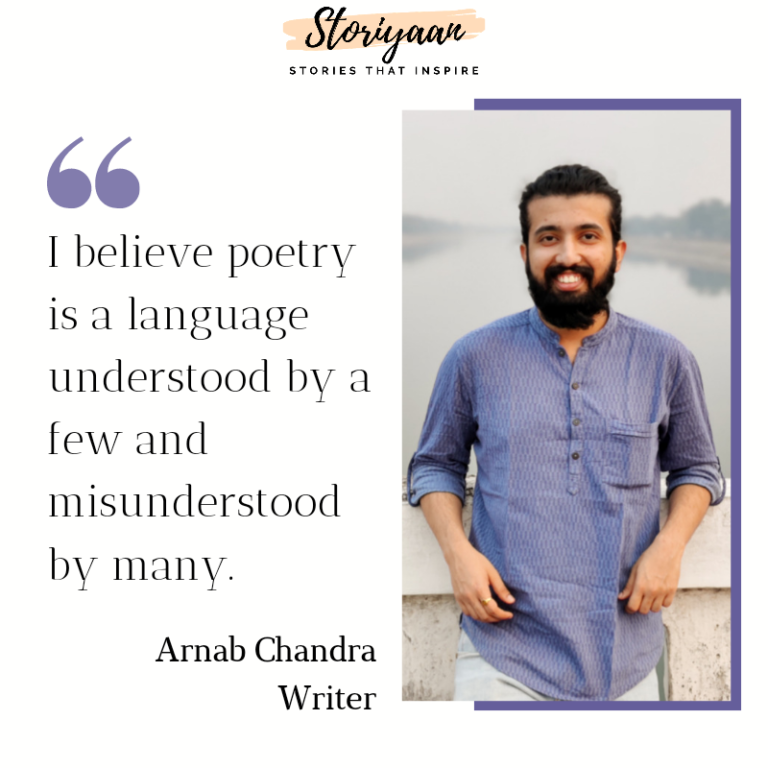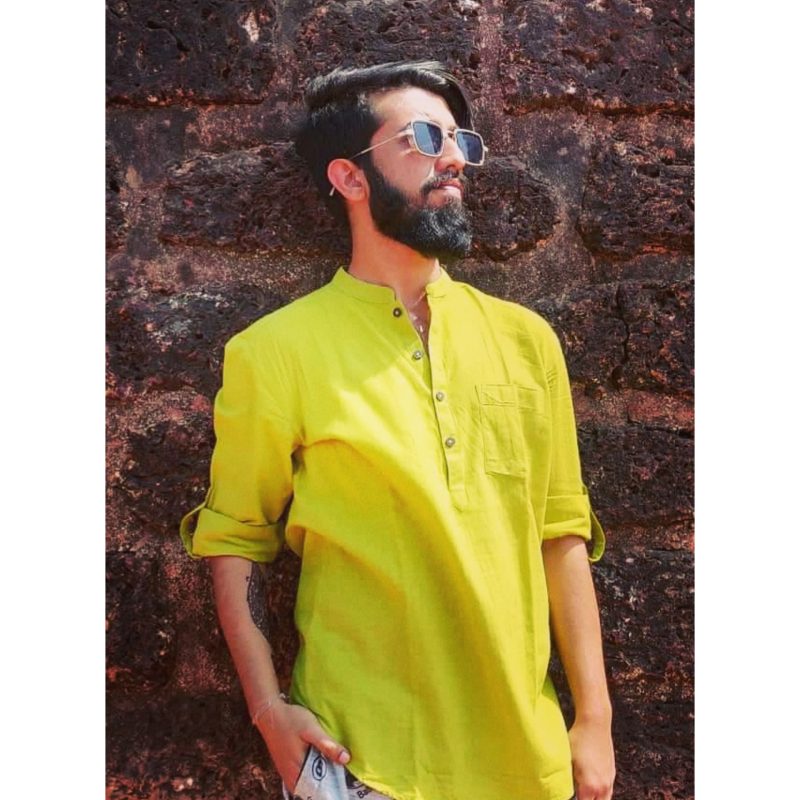It is difficult to embrace the dark side of your heart and acknowledge the tide of emotions flowing through it. This is exactly what Arnab Cnandra did. He dived into the ocean of his emotions and came out with the most beautiful and engaging poetry pieces.
In his interview with Storiyaan, Arnab Chandra gives us an insight into his wonderful mind and heart as he talks about his struggles, observations, and epiphanies, which made him fall in love with writing poetry and enabled Arnab to showcase his plethora of emotions to the world.

Interview
Questions and answers
Arnab, at what point did you recognize your latent flair for writing?
I started writing when I was 12 years old, just to observe the world around me. Scribbling down my thoughts on a piece of paper became a medium for me to vent out my thoughts, which often clogged my mind. I felt the need to write them down as soon as I could. The first poem I wrote was about the education system we were preached about and how hollow it was.
According to you, what is the hardest part of the journey of a writer?
According to me the hardest part of this journey comprises two fundamental struggles. The first is editing. I hate editing my works, but I know it’s a must. We should always focus on working on the second or, in some cases, the third draft if we are thinking of publishing them. The second is to keep your writing mind separate and isolated from your critical mind. I have struggled through this issue a lot. On one hand, I know that it is important for me to edit to make my work presentable, but if I write and try to edit simultaneously, it leads to writer’s block.
What was the turning point that made you decide to encapsulate your emotions and thoughts into a book?
I always knew I wanted to be a writer, but I was a procrastinator. I would just scribble poems and my thoughts whenever I was in the zone. One of the main reasons it took me so long to realize my dream was the plethora of mental health ailments I had to deal with. But one night, I just decided to call a publisher and get done with it. It was partly because there was a special someone in my life, to whom I had promised that I would immortalize our story in the pages of my books, even if we were not together.
How did you manage to give a new dimension to romantic yet soulful poetry using a very lucid language?
I believe poetry is a language understood by a few and misunderstood by many. Personally, poetry is like another voice in my head trying to tell me things that I can’t comprehend in my own reality. So, whenever I hear such voices, I pen them down in the language that the common crowd can understand. I want people to feel my poems and the emotions behind them. I want readers to put themselves in my shoes and visualize the imageries used in my poems.
How, in your opinion, the popularity of poetry and people's attitude towards it changed over time?
In my opinion, the audience for good poetry is still a very small segment of society. But it makes me feel good when I see that segment growing little by little every day. Although people nowadays are more into spoken word poetry and storytelling because they love to hear more than read through the lines, but I have seen some poetry books do really well in the market.
Most of your readers are more taken with the poems in "The Hopeless Romantic" than the short stories. Why do you think that is?
That’s because the three short stories that I have in my debut book are just the first drafts of the first chapters of my future projects. Each of the chapters is too short to comprehend and get good clarity on the subject matter. Whereas the poems, on the other hand, them has a different story to tell, different emotions to feel. By nature, I consider myself more of a poet, and I am glad that people could connect with my poems more.
What was the inspiration for "Misdirection"?
I was at a party where everyone was intoxicated, including me. I slowly started phasing out into my very own mind palace when I had this epiphany on how everything seems so fabricated in real life. Everyone was smiling or laughing that night, and yet I knew for sure that most of them were going through a tough time with their own share of struggles, but they felt the need to masquerade those emotions behind happy smiles. There’s a very popular saying, ‘Fake it till you make it,’ and that’s exactly how I felt while observing these people. In this piece, I tried capturing the helplessness of people when they choose a path, and then they feel that they don’t have an option to retreat anymore, and that’s where I would want to say that there is always a backdoor, and you can always escape. Retrospect and live how you want to and not how you are supposed to!
Arnab, can you tell us about the cover-page illustration and its significance.
It portrays how I visualize my life. A giant dark and desolate alley in shades of everything monochrome where I am standing by myself, phased out into a blurred reality of my own and contemplating on my troubled thoughts and trying to make sense out of them. One takeaway from the illustration is that although I have to face my demons every day and night and everything in my life seems to lose its colors, I am not yet ready to bow down, and I like to face my dark necessities head-on.
The book explores a plethora of emotions that seems to satiate every palate of readers. What is it, according to you, which makes it so relatable to the readers?
Contrary to this statement, I am very skeptical if my poems are at all relatable to the readers. Since I write very personal stuff, and if someone relates to those feelings I talk about and can visualize the poetic scenery, it makes me feel so good as a poet.
How has the digital era proven to be consequential in the publication of your book and its promotion?
My book was launched online during the lockdown. All thanks go to the digital era for kick-starting my writing career. Starting from the book launch to the online marketing and book reviews, everything is done in the digital space, so I owe a lot to our society going digital.
What is that one thing that you want people to take away from your book?
Never wait for the light at the end of your tunnel. Embrace your darkness, wear it like a precious jacket and try to befriend it if you can. It’s going to be less painful. Acknowledge your pain enough to let it flow through you. Don’t fall for fake positivity, which is so prevalent nowadays in this ocean of chaos. Your struggle and your hardships are yours, and if you don’t feel okay, it’s okay. Just introspect before taking any drastic steps, and you’ll be cool.
You have a dog that you seem to dote on. How did having a pet change your perspective on life?
It changed everything. In short, life doesn’t seem like a burden anymore as I now have a constant companion, and it feels great being a dad to a pawfect daughter.
Could you provide us an insight into your upcoming projects?
My upcoming project is another book of poems. This book will contain poems on my mental health, how I have dealt with my share of darkness, how I fight them every day, what you should keep in life, and what you should let go of. Its talks about an unrequited tough love too. It’s going to be launched hopefully during Durga Puja 2021.
Quick 5
a. Which one do you prefer to read- Poetry or Novels? : I would opt for poetry over novels any day.
b. Most overrated book, in your opinion? : Love, Hope, and Magic
c. Favourite book : None. I seldom read books.
d. Your favorite piece from your book : Chandelier
e. If not, an engineer, what would you have chosen to be, apart from a writer? : Mental Health Advocate/Therapist.

